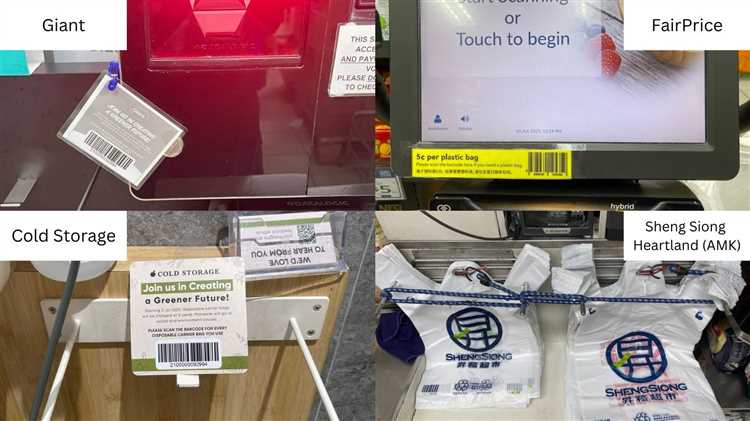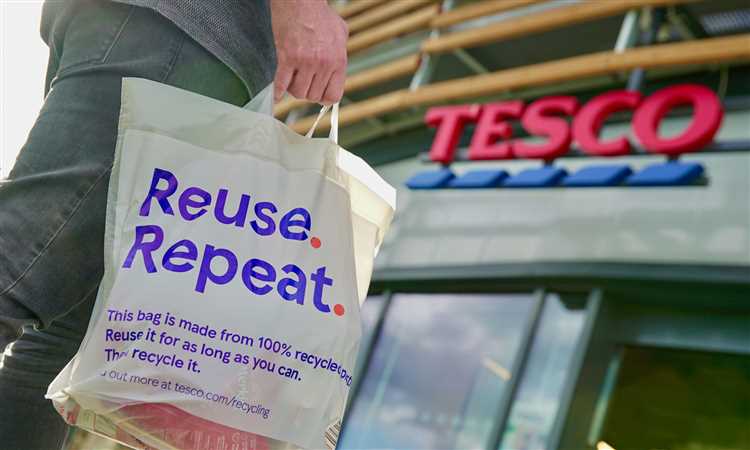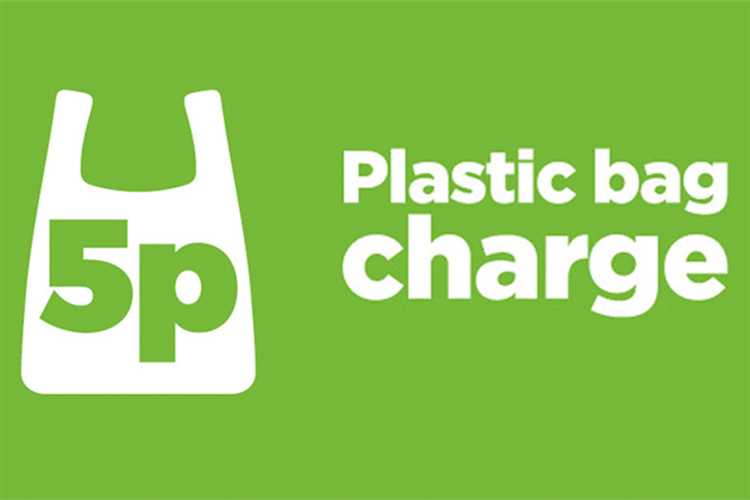
The issue of plastic waste has become a growing concern around the world. With billions of single-use plastic bags ending up in landfills and polluting our oceans every year, many countries and cities have taken steps to reduce their plastic consumption. One of the most effective measures has been the introduction of charges for plastic bags in supermarkets.
There are several reasons why supermarkets have started charging for plastic bags. Firstly, it is an effort to encourage customers to bring their own reusable bags. By making customers pay for plastic bags, supermarkets are incentivizing them to adopt more sustainable practices and reduce their reliance on single-use plastics.
Secondly, charging for plastic bags helps reduce the environmental impact of plastic waste. Plastic bags take hundreds of years to decompose, and in the process, they release harmful chemicals into the environment. By discouraging the use of plastic bags, supermarkets are contributing to the reduction of plastic pollution and protecting wildlife and ecosystems.
- Environmental impact of plastic bags
- Reducing plastic waste through charging
- The role of education and awareness
- The ripple effect
- Encouraging responsible consumer behavior
- Financial implications for supermarkets
- Funding environmental initiatives
- Creating a more sustainable future
- Reducing plastic waste
- Promoting reusable alternatives
- Question-answer:
- Why do supermarkets charge for plastic bags?
- How much do supermarkets charge for plastic bags?
- Do all supermarkets charge for plastic bags?
- What are the benefits of charging for plastic bags?
- Are there any exemptions for charging for plastic bags?
Environmental impact of plastic bags
Plastic bags have become a ubiquitous part of our everyday lives, but their convenience comes at a significant environmental cost. The production, use, and disposal of plastic bags contribute to a range of negative impacts on our environment, from pollution and wildlife harm to resource depletion and climate change.
Firstly, the production of plastic bags requires a significant amount of energy and resources. The extraction and processing of raw materials, such as petroleum and natural gas, contribute to air and water pollution, as well as greenhouse gas emissions. Additionally, the manufacturing process itself requires large amounts of energy, further contributing to carbon emissions and climate change.
Once produced, plastic bags are often used for just a short period of time before being discarded. This short lifespan poses a threat to wildlife and ecosystems. Plastic bags are lightweight and can easily be carried by wind and water, ending up in rivers, oceans, and other natural habitats. Marine animals, birds, and other wildlife can mistake plastic bags for food or become entangled in them, leading to injury, suffocation, and death.
Furthermore, plastic bags do not readily biodegrade. Instead, they break down into smaller pieces called microplastics, which persist in the environment for hundreds of years. These microplastics can accumulate in soil, water bodies, and even in the bodies of animals, posing a long-term threat to ecosystems and human health.
The disposal of plastic bags also contributes to land pollution. Improperly discarded bags can end up in landfills, where they take up valuable space and release toxic pollutants as they degrade. Moreover, plastic bags that are littered can clog drainage systems, leading to floods and other environmental issues.
Recognizing the detrimental environmental impacts of plastic bags, many supermarkets have adopted measures to reduce their use. Charging for plastic bags has been implemented as a way to encourage consumers to bring their own reusable bags, thus minimizing the demand for single-use plastic bags and mitigating their environmental impact.
Overall, the environmental impact of plastic bags is extensive and significant. It is crucial that we reduce our reliance on plastic bags and make more sustainable choices to protect our planet and future generations.
Reducing plastic waste through charging

Charging for plastic bags in supermarkets has emerged as an effective strategy to reduce plastic waste. By adding a small fee for each bag, supermarkets are able to incentivize customers to bring their own reusable bags and reduce their dependence on single-use plastic.
This initiative has been successful in several ways. First, it reduces the overall demand for plastic bags. When customers are required to pay for bags, they are more likely to bring their own or find alternative ways to carry their purchases, such as using tote bags or backpacks. This leads to a decrease in the number of plastic bags being used and ultimately reduces plastic waste.
Second, charging for bags encourages customers to be more conscious of their consumption habits. When faced with an additional cost, customers tend to think twice before taking a bag they don’t really need. They become more aware of the environmental impact of their actions and are more likely to make conscious choices to reduce their plastic consumption.
The role of education and awareness

In addition to the financial incentive, educating customers about the negative impacts of plastic waste is crucial. Supermarkets play a major role in raising awareness about the environmental consequences of plastic pollution. By explaining the reasons behind the bag charge and providing information about the benefits of reducing plastic waste, supermarkets can motivate customers to actively participate in the initiative.
The ripple effect
Another positive outcome of charging for plastic bags is the ripple effect it creates. When one supermarket implements this policy, others in the area are more likely to follow suit. This leads to a wider adoption of the initiative, resulting in a significant reduction in plastic waste across the entire community.
In conclusion, charging for plastic bags in supermarkets is an effective way to reduce plastic waste. It not only decreases the demand for plastic bags but also encourages customers to be more mindful of their consumption habits. By combining financial incentives with education and community-wide adoption, supermarkets can play a vital role in promoting sustainable practices and reducing the environmental impact of plastic waste.
Encouraging responsible consumer behavior
Charging for plastic bags in supermarkets is not just a strategy to reduce environmental pollution, but also a way to encourage responsible consumer behavior. By implementing this measure, supermarkets are incentivizing customers to bring their own reusable bags or use other alternatives such as paper or cloth bags.
Encouraging responsible consumer behavior is essential in tackling the problem of plastic waste. Plastic bags not only contribute to pollution but also take a significant amount of time to degrade, posing a long-term threat to the environment. By charging for plastic bags, supermarkets are raising awareness among consumers about the need to reduce their plastic consumption and make sustainable choices.
Furthermore, by making customers pay for plastic bags, supermarkets are reminding them of the actual cost associated with this convenience. This prompts consumers to reconsider their reliance on single-use plastic items and opt for more environmentally friendly options. It challenges the notion of disposable convenience and encourages the adoption of sustainable habits.
Additionally, this approach promotes a sense of individual responsibility towards the environment. When customers are charged for plastic bags, they are more likely to evaluate the necessity of using them and search for alternatives. It empowers consumers to make conscious decisions and actively participate in preserving the environment.
In conclusion, charging for plastic bags in supermarkets serves not only as a means to reduce plastic waste but also as a way to encourage responsible consumer behavior. By creating incentives to bring reusable bags and raising awareness about the environmental impact of plastic bags, supermarkets play a vital role in promoting sustainability and empowering individuals to make more conscious choices.
Financial implications for supermarkets
Implementing a charge for plastic bags in supermarkets has significant financial implications for these businesses. While the charge may seem small, it can result in a substantial increase in revenue for supermarkets.
Firstly, charging for plastic bags provides an opportunity for supermarkets to generate additional income. By selling bags at a nominal price, supermarkets can increase their profit margins. This additional revenue can be used to invest in sustainability initiatives or improve the overall shopping experience for customers.
Furthermore, the introduction of a charge for plastic bags can help reduce operating costs for supermarkets. Plastic bags are not only harmful to the environment, but they also have a financial cost. By charging for these bags, supermarkets can decrease the amount of plastic bags they distribute, thereby reducing their expenses related to purchasing and stocking bags.
In addition, implementing a charge for plastic bags can create positive PR for supermarkets. By taking a stand against plastic waste and promoting sustainable practices, supermarkets can improve their brand image and attract environmentally conscious customers. This can result in increased customer loyalty and higher sales.
However, it is important for supermarkets to consider the potential backlash from customers who are used to receiving free plastic bags. Some customers may be resistant to the idea of paying for bags and could choose to shop at competing stores that continue to offer free bags. This could result in a temporary decrease in sales for supermarkets.
Overall, the financial implications of charging for plastic bags in supermarkets are generally positive. The additional revenue, cost savings, and positive PR can outweigh any potential short-term decline in sales. By implementing this change, supermarkets demonstrate their commitment to sustainability and create a more eco-friendly shopping environment for their customers.
Funding environmental initiatives
Charging for plastic bags in supermarkets is a way to fund environmental initiatives aimed at reducing plastic waste and protecting the environment. By charging a small fee for each plastic bag, supermarkets are able to generate revenue that can be used to support various sustainability projects.
One of the main reasons for supermarkets to implement these charges is to encourage customers to bring their own reusable bags. By making plastic bags less convenient and more expensive, supermarkets are incentivizing shoppers to bring their own bags, reducing the demand for single-use plastic bags.
The funds collected from the plastic bag charges can be used to support initiatives such as promoting recycling, funding research and development of alternative packaging materials, and organizing educational campaigns to raise awareness about the environmental impact of plastic waste. These initiatives can help to create a more sustainable future by reducing the amount of plastic waste that ends up in landfills or pollutes our oceans and natural habitats.
Additionally, the charges for plastic bags can also serve as a deterrent. When customers are required to pay for something that was previously offered for free, they are more likely to think twice before using a plastic bag. This change in consumer behavior can have a significant impact on reducing the amount of plastic waste generated by supermarkets and their customers.
Overall, funding environmental initiatives through the charges for plastic bags is a practical and effective approach to tackling the issue of plastic waste. By creating financial incentives for both supermarkets and customers to reduce their reliance on single-use plastic bags, this strategy can support the development of more sustainable practices and promote a greener future.
Creating a more sustainable future
In recent years, there has been a growing global awareness of the importance of sustainability and the need to reduce our environmental impact. Supermarkets have recognized their role in this movement and are taking steps towards creating a more sustainable future.
One of the major initiatives that supermarkets have undertaken is charging for plastic bags. This decision has been driven by the negative impact that single-use plastic bags have on the environment. Plastic bags are non-biodegradable and can take up to hundreds of years to decompose. They also contribute to the pollution of our oceans and harm wildlife.
Reducing plastic waste
By charging for plastic bags, supermarkets aim to reduce the consumption of single-use plastics. This encourages shoppers to bring their own reusable bags or choose alternatives like paper or cloth bags. By reducing the demand for plastic bags, supermarkets can effectively reduce the amount of plastic waste that ends up in landfills or the environment.
This initiative has been successful in many countries, leading to a significant decrease in plastic bag usage. It not only helps to reduce plastic waste, but also promotes a shift towards more sustainable shopping habits.
Promoting reusable alternatives
Supermarkets are also actively promoting reusable alternatives to plastic bags. They often offer a variety of options, such as sturdy reusable bags and collapsible bags that are easy to carry around. This encourages customers to make the switch and adopt reusable options, reducing their reliance on single-use plastics.
In addition to bags, supermarkets are also promoting other sustainable options like reusable containers for fruits and vegetables, reusable water bottles, and refill stations for household products. These initiatives aim to reduce the overall use of plastic and encourage a more eco-friendly lifestyle.
In conclusion, supermarkets are taking steps towards creating a more sustainable future by charging for plastic bags. This initiative helps to reduce plastic waste and promotes the adoption of reusable alternatives. By making small changes in our shopping habits, we can all contribute to a more environmentally friendly world.
Question-answer:
Why do supermarkets charge for plastic bags?
Supermarkets charge for plastic bags to reduce plastic waste and promote environmental sustainability. By discouraging the use of single-use plastic bags, they encourage customers to bring their own reusable bags, which can significantly reduce the amount of plastic waste that ends up in landfills or as litter in our environment.
How much do supermarkets charge for plastic bags?
The cost of plastic bags at supermarkets can vary, but it is typically around $0.10 to $0.25 per bag. Some supermarkets may offer discounts or incentives for customers who bring their own reusable bags instead.
Do all supermarkets charge for plastic bags?
No, not all supermarkets charge for plastic bags. The implementation of plastic bag charges can vary depending on the country or region. Some areas have legislation in place that requires all retailers, including supermarkets, to charge for plastic bags, while in other areas it may be a voluntary choice made by individual supermarkets to promote sustainability.
What are the benefits of charging for plastic bags?
Charging for plastic bags has several benefits. It helps to reduce the consumption of single-use plastic bags and encourages the use of reusable bags. This, in turn, reduces the amount of plastic waste that ends up in landfills or as litter. It also helps to raise awareness about the negative environmental impact of plastic bags and promotes a shift towards more sustainable shopping practices.
Are there any exemptions for charging for plastic bags?
In some cases, there may be exemptions for charging for plastic bags. For example, certain types of bags, such as those used for packaging loose fruits and vegetables, may be exempt from the charge. Additionally, some supermarkets may provide free bags for customers who are unable to bring their own due to specific circumstances, such as disability or forgetting to bring a reusable bag.